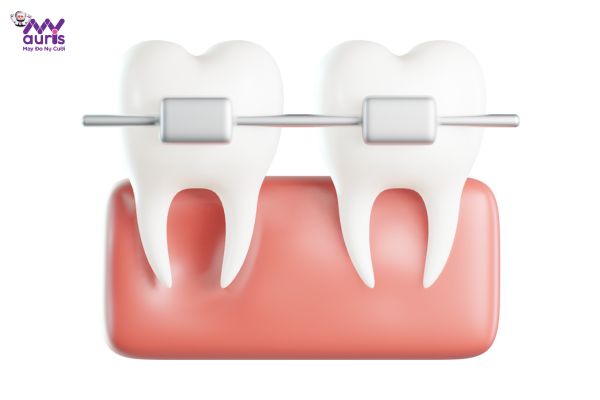Most wisdom teeth that grow are not straight but grow crookedly, grow underground, etc. This causes pain and discomfort that affects eating and many activities. However, there are still some cases of “stealing” wisdom teeth growing straight, without causing much pain or discomfort. Therefore, people in this situation wonder if wisdom teeth grow straight, should they be extracted? Let’s answer this question with My Auris dentistry through the following article.
How do wisdom teeth grow straight?
Normally, adults will have 4 wisdom teeth. However, depending on each person’s constitution, the number of teeth may vary. But in general, teeth grow during the jaw bone stage and the teeth on the jaw are complete. Because of this, wisdom teeth do not have enough space, causing many situations of growing crookedly, underground, growing horizontally, etc.
However, besides those cases, there are still many people who have wisdom teeth that grow straight, without affecting tooth number 7 or neighboring teeth. Normally, wisdom teeth that grow straight are considered good by doctors because they do not cause too many disadvantages to oral health.

At first, when the teeth begin to separate, the gums will cause pain, but after that it will not cause any pain. So should straight wisdom teeth be extracted?
Should straight wisdom teeth be extracted?
Almost like wisdom teeth Growing straight doesn’t cause too much trouble, so many people don’t care. However, because of the complications and harm of wisdom teeth, many people wonder whether they should be extracted?
According to doctors, the extraction of straight wisdom teeth also depends on the state of tooth eruption. Here are some cases where teeth should and should not be removed:
In cases where wisdom teeth grow straight
Wisdom teeth are too large
Straight teeth usually do not affect neighboring teeth, however, if wisdom teeth are too large, they will compress and affect tooth number 7. This causes the teeth to be misaligned, creating pressure on other teeth. Therefore, early removal will avoid malocclusion and limit long-term effects on the jaw bone structure.
Wisdom teeth hinder oral hygiene
Growing straight on the jaw does not cause much pain but will still create a gap between tooth number 7 and wisdom teeth. This gap makes it easy for food and plaque to cram and accumulate, creating conditions for bacteria to penetrate, leading to dental diseases.
Moreover, wisdom teeth are hidden deep in the jaw and are difficult to observe and clean, so in the long term it will lead to bad breath, tooth decay, and dental diseases. Therefore, doctors will still advise removing teeth in cases of straight growth.

Wisdom teeth grow straight and hit the nerves around the gums
The gum area is where the majority of The nerves are very sensitive. In some unwanted cases, even though wisdom teeth grow straight, they press on the nerve. This causes some dangers such as headaches and dizziness. There are even some cases that cause mouth distortion, facial misalignment and affect the entire jaw structure.
No corresponding symmetrical teeth
As mentioned, the number of wisdom teeth can vary from person to person. Thus, for people who only grow wisdom teeth in the lower jaw or only grow in the upper jaw, these teeth, although they grow straight, do not correspond. Therefore, in the long term, it will cause bite misalignment if the jaws do not fit tightly. At the same time, it can also cause serious damage to the gum area.
Although wisdom teeth grow straight, they are susceptible to decay and pulpitis. If not treated, wisdom teeth will develop pulpitis and spread to neighboring teeth. Therefore, if the initial observation shows that the tooth cannot be held even when growing straight, the doctor will prescribe extraction to avoid future effects.
Braces require wisdom teeth extraction
Whether the teeth are growing straight or crooked, when performing braces or orthodontics, teeth must be removed. Removing wisdom teeth helps create space for the teeth in the jaw to move easily, increasing aesthetic effect. Furthermore, removing wisdom teeth early before braces limits the situation of pushing teeth and shifting the jaw later.

In cases where it is not necessary to remove wisdom teeth that grow straight
In addition to some cases where wisdom teeth need to be removed to ensure oral health, there are also some cases where removal is not necessary:
Teeth have a normal structure
In a few cases, wisdom teeth not only grow straight but also have a normal structure, are not too big, and do not affect neighboring teeth, so they do not need to be removed. aspect
In some cases, wisdom teeth that fit together with the jaw bone will not cause bite misalignment in the future, and will not cause dental diseases such as periodontitis or gingivitis, so there is no need to remove the tooth.

The location of wisdom teeth growth is not beneficial
Gums covering the wisdom teeth are quite a common sign. Normally, wisdom teeth grow last after all other teeth are complete, so there is no place on the gums to grow, so it takes a long time for the wisdom teeth to fully erupt, thus leading to gum swelling.
Gingival swelling can be improved by removal without the need for wisdom tooth extraction. At this time, the gums will develop, covering the tooth roots as normal, helping the teeth grow smoothly without causing pain.
Is wisdom tooth extraction painful? section to remove teeth easily.
The time to remove straight wisdom teeth is quick, usually takes about 10-15 minutes. The pain is also less than that of crooked, crooked, or protruding wisdom teeth. style=”font-weight: 400;”>During the tooth extraction, the doctor will disinfect and anesthetize the area to be extracted. Therefore, during this process, you will feel comfortable and pain-free. After the tooth is removed, the gum area may be swollen and painful for a few days. However, this is a normal situation and will subside quickly if you follow the doctor’s instructions and combine proper oral care and hygiene.
In addition, whether wisdom tooth extraction is painful or not depends on the skill of the doctor, the dental facility and supporting machinery and equipment. Doctors are skilled and experienced, along with modern equipment and sterile clinic facilities, the tooth extraction process goes smoothly, safely and gently.

Through the information in the article about wisdom teeth growing straight, we hope to help people gain more knowledge about wisdom teeth. From there, consider and consider the situation to find the earliest remedy. Please contact My Auris dentistry immediately for detailed advice and answers.
Anh Thy





